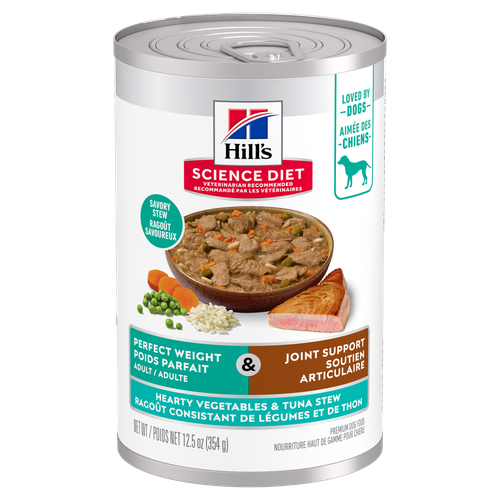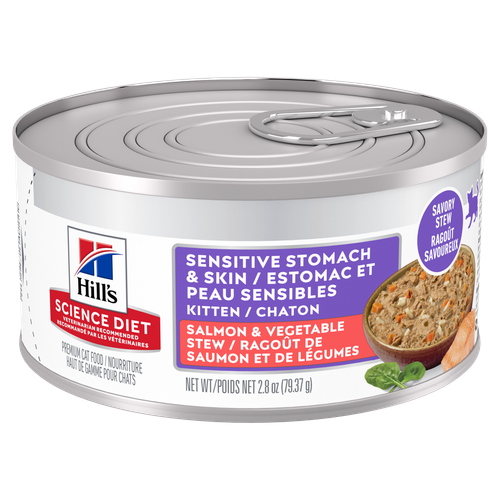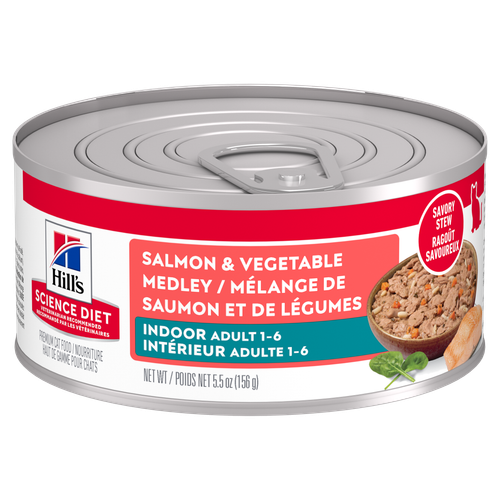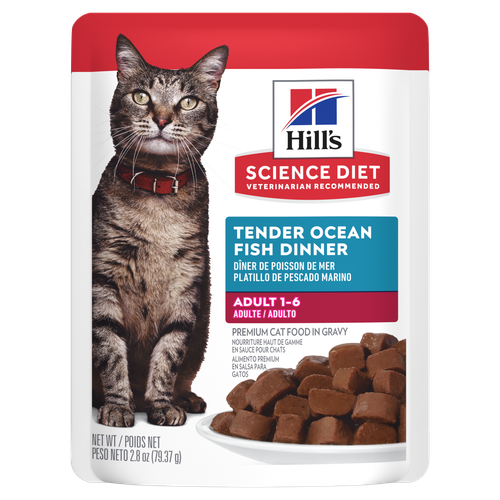
-
Find the right food for your petTake this quiz to see which food may be the best for your furry friend.Find the right food for your petTake this quiz to see which food may be the best for your furry friend.Featured products
 Adult Perfect Weight & Joint Support Hearty Vegetables and Tuna Stew Dog FoodShop Now
Adult Perfect Weight & Joint Support Hearty Vegetables and Tuna Stew Dog FoodShop Now Sensitive Stomach & Skin, assortiment de conserves
Sensitive Stomach & Skin, assortiment de conservesHill's Science Diet Sensitive Stomach & Skin Variety Pack
Shop Now Healthy Cuisine, Adulte, assortiment de conserves
Healthy Cuisine, Adulte, assortiment de conservesHill's Science Diet Healthy Cuisine Variety Pack
Shop NowFeatured products Kitten Sensitive Stomach & Skin Salmon & Vegetable Stew
Kitten Sensitive Stomach & Skin Salmon & Vegetable StewSupports kitten growth, digestive health, nourishes skin and promotes a lustrous fur
Shop Now Adult Urinary Hairball Control Savory Chicken Entrée cat food
Adult Urinary Hairball Control Savory Chicken Entrée cat foodSupports the health of the whole urinary system with optimal levels of magnesium
Shop Now Adult Indoor Salmon & Vegetable Medley Cat Food
Adult Indoor Salmon & Vegetable Medley Cat FoodPrecisely balanced nutrition for indoor cats with the delicious taste of savory salmon and vegetables
Shop Now -
Dog
- Dog Tips & Articles
-
Health Category
- Weight
- Food & Environmental Sensitivities
- Urinary
- Digestive
- Joint
- Kidney
- Dental
- Cancer
-
Life Stage
- Puppy Nutrition
- Adult Nutrition
- Senior Nutrition
Cat- Cat Tips & Articles
-
Health Category
- Weight
- Skin & Food Sensitivities
- Urinary
- Digestive
- Kidney
- Dental
- Stress
- Cancer
-
Life Stage
- Kitten Nutrition
- Adult Nutrition
Featured articles Pet Food Storage Tips
Pet Food Storage TipsDiscover how and where to store your dry, as well as canned, dog and cat food. Learn how to find the "best before" dates on all Hill's pet food packaging.
Read More The Incredible Science Behind Your Pet's Microbiome
The Incredible Science Behind Your Pet's MicrobiomeLearn what a pet's microbiome is, how it contributes to your pet's gut & overall health, and why nutrition is important in maintaining healthy microbiomes.
Read More Compare Your Pet Food's Calories to Other Brands
Compare Your Pet Food's Calories to Other BrandsCompare Hill's Science Diet dog and cat food's calories against other pet food brands and AAFCO recommended maximum calorie count.
Read More -


What are food allergies or food intolerance?
Food allergies / intolerance are caused by a reaction to a particular ingredient, which is usually a protein. Sometimes referred to as an ‘adverse reaction to food,’ it is defined as an abnormal response to a food or food additive. There are two classes of adverse reactions: those in which the immune system is involved (generally called food allergies); and those that occur without an immune component (generally called food intolerances).
Allergies may last a lifetime so the ingredient must be permanently removed from your cat’s food.
What causes food allergies or food intolerance?
It may take months or years before your cat develops an allergic response to a particular food. However, once she's allergic, she will almost always have a negative reaction to that food. Allergic reactions are most commonly associated with protein sources – usually the meat in your cat’s food.
Food: The most common causes of food allergies and food intolerance in cats are beef, milk products and fish.
Damage: Inflammation, infection, surgery and some medications can damage the digestive system and may lead to food allergies or food intolerance.
Age: Food allergies and food intolerance can occur at any age.
Breed: Some cat breeds appear more likely to develop food allergies or food intolerance, including Siamese cats.
Is my cat sensitive to foods?
If your cat vomits frequently, has diarrhea, irritated skin, a poor coat condition or hair loss, then she may have a food allergy. The most common symptoms of a food allergy or food intolerance are digestive upset or skin irritation. If your cat has food allergies or food intolerance, you may notice some of the following signs:
- Vomiting or diarrhea
- Flatulence
- Frequent scratching or hair loss
- Red, inflamed skin
- Chronic ear problems
- Poor growth in young dogs
- Coughing, wheezing and sneezing

IMPORTANT: Some symptoms of food allergies or food intolerance are similar to those of other serious conditions so consult your veterinarian if you notice any of these signs.


Tasty Tips
The importance of nutrition
Food allergies or food intolerance may last a lifetime. The main goal in managing allergies or adverse reactions to food is to find and avoid the food ingredient responsible for causing the skin and/or gastrointestinal signs. If your cat suffers from food allergies, it’s even more important to feed the right cat food.
Dietary elimination trials --- removing the ingredient from the food your cat eats --- are the most practical and accurate methods of diagnosing food allergies in cats. The food your cat eats should be balanced and contain as few ingredients and additives as possible. Be mindful to remove access to all other cat food, table food, treats, snacks and chew toys while you are isolating the allergen.
If your cat has an allergic reaction to a certain meat, you may want to try a food with a new protein source - new to your dog, that is - such as duck or venison. If none of this helps, your cat may be allergic to these proteins and will need a food with specially broken-down proteins. For accurate diagnosis and treatment options, always consult your veterinarian and ask them to recommend the best food for your cat’s food allergies
Food Allergy Questions to Ask Your Veterinarian:
- Are there any foods I should avoid giving my cat because of her allergies?
- Ask how human food may affect your cat’s health.
- Would you recommend a Hill’s® Prescription Diet® or Science Diet® cat food for my allergies?
- Ask about special nutritional concerns for your cat
- How much / how often you should feed the recommended food to your cat
- Discuss which treats you can feed your cat with the recommended food
- How quickly should I expect to see signs of improvement in my cat’s condition?
- Can you provide me with written instructions or a handout on food allergies for my cat?
- What is the best way (email/phone) to reach you or your hospital if I have questions?
- Ask if you need a follow-up appointment.
- Ask if a reminder email or notice will be sent.


One of our staff authors prepared this article for you
Related products

With delicious chunks in a decadent gravy

With delicious chunks in a decadent gravy

With delicious chunks in a decadent gravy

Over 70% of cats lost weight within 10 weeks when fed this nutrition
Related articles

Discover the benefits of Hill's line of kitten foods and how they provide complete and balance nutrition for growing kittens.

When you adopt a cat, you don't just gain a best friend; you also save her life. Here's why getting a cat from a local animal shelter makes so much sense.

What is the best food for an overweight cat? Learn all about weight control food for cats, including what's in it and how it works.

Discover how to identify cat sensitive skin and what you can do to help your cat thrive from head to paw.

Put your cat on a diet without them knowing
Our low calorie formula helps you control your cat's weight. It's packed with high-quality protein for building lean muscles, and made with purposeful ingredients for a flavorful, nutritious meal. Clinically proven antioxidants, Vitamin C+E, help promote a healthy immune system.
Put your cat on a diet without them knowing
Our low calorie formula helps you control your cat's weight. It's packed with high-quality protein for building lean muscles, and made with purposeful ingredients for a flavorful, nutritious meal. Clinically proven antioxidants, Vitamin C+E, help promote a healthy immune system.

